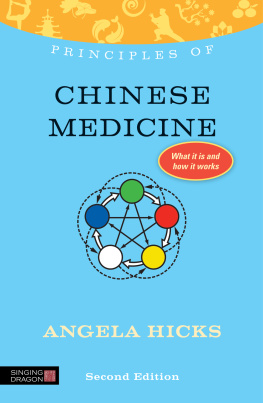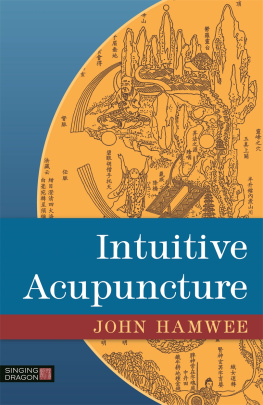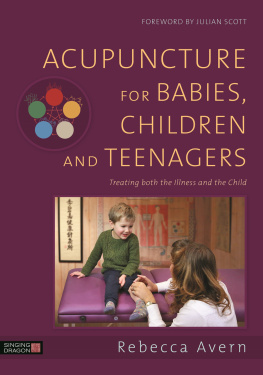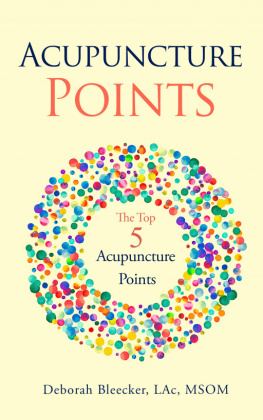ANGELA HICKS has been an acupuncturist since 1976. She is the co-founder and joint principal of the College of Integrated Chinese Medicine in Reading, one of the largest colleges in the UK, which is affiliated with Kingston University. She is the author of The Principles of Chinese Medicine, The Principles of Acupuncture, Five Secrets of Health and Happiness and co-author of Healing Your Emotions and Five Element Constitutional Acupuncture.
Published by Hachette Digital
ISBN: 978-1-405-51228-2
Copyright 2005 by Angela Hicks
All rights reserved. No part of this publication may be reproduced, stored in a retrieval system, or transmitted, in any form or by any means, without the prior permission in writing of the publisher.
Hachette Digital
Little, Brown Book Group
100 Victoria Embankment
London, EC4Y 0DY
www.hachette.co.uk
This book is written as an informative guide to acupuncture and is not meant to be a self-help book for treatment.
I have capitalised all Chinese medicine terminology in order to differentiate it from standard English terms. For example, the Kidneys in upper case signifies the Chinese medicine term (i.e. the Kidneys and its Chinese medicine functions). The kidneys in lower case represents the kidneys as they are described in Western medicine.
My thanks to all of the people who have helped me to write this book. First, thank you to all of my own patients, the patients of Susan Tosoni, Sandy Steele, Michael Pringle, Vanessa Lampert and Jill Glover and patients of third-year students that I supervised, who talked with me about their experiences of acupuncture. The names of all patients have been changed to protect confidentiality.
Second, thanks to the practitioners who discussed information about specialised treatments: Beth Soderstrom, Soreh Levy and Carolyn MacDonald drug dependency; Julian Scott and Celene Kershen the treatment of children; Ann Hutchison and Geraldine Worthington veterinary acupuncture; Diana Griffin auricular acupuncture; Xiao Yang Zhang guasha; David Mayor electro-acupuncture; Jamie Hedger and Qing Zhang facial rejuvenation; Jill Glover and Sally Blades treatment in childbirth. Thanks also to Mark Bovey of the Acupuncture Research Resource Centre who directed me towards relevant research. Also Persis Tamboly at the BAcC who helped me with the list of professional bodies and societies, to Liong-Sen Liew for providing the Chinese characters and to Peter Eckman and Neal White for the drawings.
Third, thanks to all those who have helped me by reading this book, most notably Judith Clark for her brilliant proofreading, Peter Mole who helped me with the big picture and Jane Grossfeld who made so many helpful comments. Also thank you to Gill Bailey, Anna Crago, Jo Brooks and Helen Stanton at Piatkus for all of their help and support.
Many people have helped me to deepen my appreciation of Chinese medicine, especially J. R. Worsley. I am deeply grateful to him for his inspiration and for teaching me the importance of treating the mind and spirit as well as the body. Also thank you to others who have taught me, including doctors in China who were so helpful to me when I was learning TCM.
Thanks as well to all my friends and colleagues in the acupuncture community its a wonderful community that I deeply treasure.
Finally, my thanks and love to John, my husband, who is always so supportive and encouraging and to whom I dedicate this book.
Disclaimer
The contents of this book are for information only. The author recommends that you consult qualified practitioners when considering acupuncture. Do not attempt to self-treat or alter your medication without consulting your doctor. The author and publisher cannot accept any responsibility for illness or injury arising out of failure to follow these guidelines.
I first started studying acupuncture in 1973. Now, over thirty-five years later, I run an acupuncture college in the UK and I am still as inspired and excited as I was when I began studying.
Back in 1973 acupuncture was a little-known treatment and was usually classified as a fringe medicine. I was impressed to see it transform a close friends health and, knowing I would love to help people, I trustingly decided that this would be my future career.
With no other evidence as to its beneficial effects I embarked on a three-year course of study and at the same time started a course of acupuncture treatment. I began the treatment thinking that I had no problems with my health, but that the experience of acupuncture would make me a better practitioner. It did, in fact, profoundly improve my health something I still never forget whenever I treat other people.
When I started treatment I would not have described myself as being ill. Like other healthy people I never caught colds and flu and never took time off work. I felt tired and weak most of the time, but I didnt think there was anything that could be done to help that. I was also permanently anxious, but that was how Id been for most of my life, so I accepted it. I knew I didnt always sleep well at night and I had other minor symptoms such as my terrible memory (at school I held the record for having the most belongings in lost property in one week). But poor concentration was not something I associated with poor health. More than anything else, though, I felt slightly miserable much of the time and didnt know why like many other people, I thought this was my lot in life.
When I initially went for treatment, my practitioner asked me many questions about myself. She felt some pulses on the radial artery of my wrist and carried out other examinations to find out more about my health. She then gave me some acupuncture treatment.
My experience after the first treatment was stunning. I knew something had changed and I definitely felt much better in myself. There was something else, though, that I couldnt quite put my finger on. Finally, I realised that for a long time my life had felt totally flat. Id carried that feeling with me for so long that I didnt even know it was there. Now for the first time in my life I felt that it was positively good to be alive!
Never again since then has that awful feeling returned, and over a period of time I felt increasingly strong physically and happier in my spirits. I look back at the younger me and know that without doubt that treatment transformed my life.
My practitioner later told me that she had diagnosed my symptoms to be coming from my Heart and Heart Protector. This didnt mean I had a heart problem in a conventional sense. Im sure a test given by a doctor would have found nothing wrong with my heart. In Chinese medicine a Heart problem causes many different signs and symptoms some physical and others relating to the emotions, mind or spirit.
Since that time I have given literally thousands of acupuncture treatments myself and have seen it transform the lives of many of my patients. The way lives are transformed is always individual sometimes there is a rapid change and at other times a slow, steady but solid shift. Obviously not everyone gets completely better but it helps large numbers of people. As you might expect, an acupuncturist considers each person to be completely unique and all treatments are tailor-made to suit the individual. Alongside a change in symptoms, patients almost always experience an increased feeling of well-being. This indicates that changes in health are arising from deep within. Later on in the book you will read other patients accounts of the differences they experienced after treatment.
Times have really changed since those early years when I first became a practitioner. At that time acupuncture was often a last resort for patients; they only came for acupuncture when all other treatments had failed. Now it is often a patients first choice. I have continued to benefit from treatment and, along with Qigong (Chinese exercise) and following a fairly balanced lifestyle regime, I have used it to further improve my health and to deal with any difficulties life has thrown at me. I have had other patients do the same. One of my patients, who is now 88, has been coming for treatment, and keeping herself healthy, for over 30 years. She is remarkably youthful for her age and she swears that acupuncture has contributed to keeping her from ageing.






